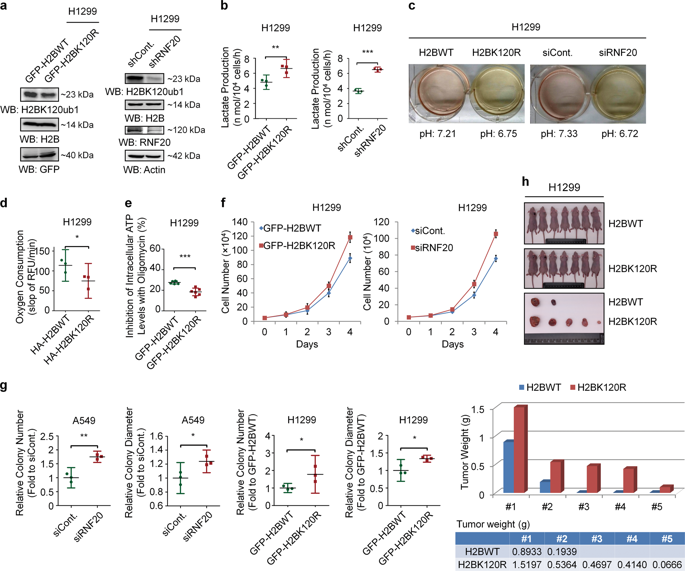当前位置:
X-MOL 学术
›
Cell Death Differ.
›
论文详情
Our official English website, www.x-mol.net, welcomes your
feedback! (Note: you will need to create a separate account there.)
Epigenetic regulation of the Warburg effect by H2B monoubiquitination.
Cell Death and Differentiation ( IF 13.7 ) Pub Date : 2019-11-04 , DOI: 10.1038/s41418-019-0450-2 Yuan-Ya Jing 1 , Feng-Feng Cai 2 , Lei Zhang 1 , Jing Han 3 , Lu Yang 3 , Fan Tang 1 , Ya-Bin Li 1 , Jian-Feng Chang 1 , Feng Sun 1 , Xiao-Mei Yang 1 , Fang-Lin Sun 1 , Su Chen 3, 4
Cell Death and Differentiation ( IF 13.7 ) Pub Date : 2019-11-04 , DOI: 10.1038/s41418-019-0450-2 Yuan-Ya Jing 1 , Feng-Feng Cai 2 , Lei Zhang 1 , Jing Han 3 , Lu Yang 3 , Fan Tang 1 , Ya-Bin Li 1 , Jian-Feng Chang 1 , Feng Sun 1 , Xiao-Mei Yang 1 , Fang-Lin Sun 1 , Su Chen 3, 4
Affiliation

|
Cancer cells reprogram their energy metabolic system from the mitochondrial oxidative phosphorylation (OXPHOS) pathway to a glucose-dependent aerobic glycolysis pathway. This metabolic reprogramming phenomenon is known as the Warburg effect, a significant hallmark of cancer. However, the detailed mechanisms underlying this event or triggering this reprogramming remain largely unclear. Here, we found that histone H2B monoubiquitination (H2Bub1) negatively regulates the Warburg effect and tumorigenesis in human lung cancer cells (H1299 and A549 cell lines) likely through controlling the expression of multiple mitochondrial respiratory genes, which are essential for OXPHOS. Moreover, our work also suggested that pyruvate kinase M2 (PKM2), the rate-limiting enzyme of glycolysis, can directly interact with H2B in vivo and in vitro and negatively regulate the level of H2Bub1. The inhibition of cell proliferation and nude mice xenograft of human lung cancer cells induced by PKM2 knockdown can be partially rescued through lowering H2Bub1 levels, which indicates that the oncogenic function of PKM2 is achieved, at least partially, through the control of H2Bub1. Furthermore, PKM2 and H2Bub1 levels are negatively correlated in cancer specimens. Therefore, these findings not only provide a novel mechanism triggering the Warburg effect that is mediated through an epigenetic pathway (H2Bub1) but also reveal a novel metabolic regulator (PKM2) for the epigenetic mark H2Bub1. Thus, the PKM2-H2Bub1 axis may become a promising cancer therapeutic target.
中文翻译:

H2B 单泛素化对 Warburg 效应的表观遗传调控。
癌细胞将其能量代谢系统从线粒体氧化磷酸化(OXPHOS)途径重新编程为葡萄糖依赖性有氧糖酵解途径。这种代谢重编程现象被称为瓦尔堡效应,是癌症的一个重要标志。然而,这一事件或触发这种重编程的详细机制仍不清楚。在这里,我们发现组蛋白 H2B 单泛素化 (H2Bub1) 可能通过控制多个线粒体呼吸基因的表达来负向调节人肺癌细胞(H1299 和 A549 细胞系)的 Warburg 效应和肿瘤发生,这些基因对于 OXPHOS 至关重要。此外,我们的工作还表明,糖酵解限速酶丙酮酸激酶M2(PKM2)可以在体内和体外直接与H2B相互作用,并负向调节H2Bub1的水平。 PKM2敲低诱导的人肺癌细胞增殖和裸鼠异种移植的抑制可以通过降低H2Bub1水平得到部分挽救,这表明PKM2的致癌功能至少部分是通过H2Bub1的控制来实现的。此外,癌症样本中 PKM2 和 H2Bub1 水平呈负相关。因此,这些发现不仅提供了一种通过表观遗传途径(H2Bub1)介导的触发Warburg效应的新机制,而且还揭示了表观遗传标记H2Bub1的新型代谢调节因子(PKM2)。因此,PKM2-H2Bub1轴可能成为一个有前途的癌症治疗靶点。
更新日期:2019-11-04
中文翻译:

H2B 单泛素化对 Warburg 效应的表观遗传调控。
癌细胞将其能量代谢系统从线粒体氧化磷酸化(OXPHOS)途径重新编程为葡萄糖依赖性有氧糖酵解途径。这种代谢重编程现象被称为瓦尔堡效应,是癌症的一个重要标志。然而,这一事件或触发这种重编程的详细机制仍不清楚。在这里,我们发现组蛋白 H2B 单泛素化 (H2Bub1) 可能通过控制多个线粒体呼吸基因的表达来负向调节人肺癌细胞(H1299 和 A549 细胞系)的 Warburg 效应和肿瘤发生,这些基因对于 OXPHOS 至关重要。此外,我们的工作还表明,糖酵解限速酶丙酮酸激酶M2(PKM2)可以在体内和体外直接与H2B相互作用,并负向调节H2Bub1的水平。 PKM2敲低诱导的人肺癌细胞增殖和裸鼠异种移植的抑制可以通过降低H2Bub1水平得到部分挽救,这表明PKM2的致癌功能至少部分是通过H2Bub1的控制来实现的。此外,癌症样本中 PKM2 和 H2Bub1 水平呈负相关。因此,这些发现不仅提供了一种通过表观遗传途径(H2Bub1)介导的触发Warburg效应的新机制,而且还揭示了表观遗传标记H2Bub1的新型代谢调节因子(PKM2)。因此,PKM2-H2Bub1轴可能成为一个有前途的癌症治疗靶点。











































 京公网安备 11010802027423号
京公网安备 11010802027423号